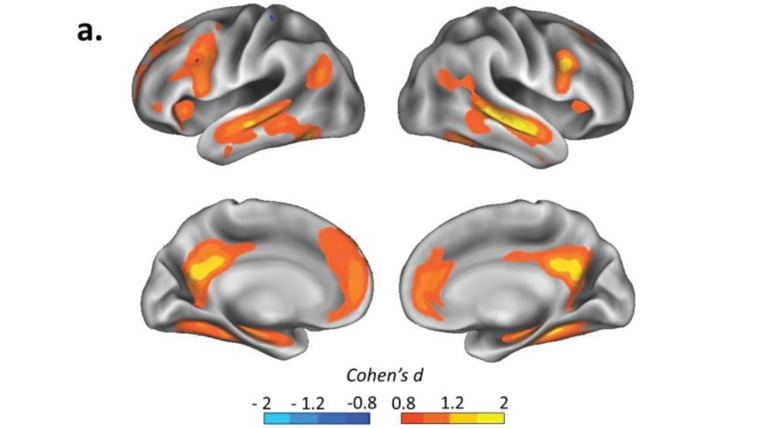Pregnancy changes a woman’s brain, and the changes last for at least two years, European researchers reported Monday.
The changes are so clear and consistent that it’s possible to tell if a woman had a child simply by looking at her brain scans, the team reported in the journal Nature Neuroscience.
The changes look like a careful pruning of connections, perhaps in a way that helps a woman focus better on her baby, the researchers said.

And while any woman who’s had a baby will attest to foggy thinking at least some of the time, the researchers say they couldn’t find any evidence of “baby-brain” in the women they examined. They scored about the same on tests of memory and vocabulary both before and after giving birth.
“Our data provide the first evidence that pregnancy confers long-lasting changes in a woman’s brain,” Elseline Hoekzema of Leiden University in the Netherlands and colleagues at the Universitat Autònoma de Barcelona in Spain wrote.
Related: Baby should sleep in same room as parents for up to a year
They did magnetic resonance imaging (MRI) scans on 25 women both before they got pregnant and for as long as two years after they gave birth. They also scanned the brains of 36 men, including 19 first-time fathers.
A better mother
The women who had just had their first baby had less “gray matter” — which includes brain cells — in the cerebral cortex, Hoekzema’s team found. Neuroscientists say the specific areas that got pruned appear to be involved in understanding what other people are thinking or feeling.
Men did not show the same changes.
“The pattern of changes appeared to be linked with the attachment a mother showed toward her baby, the team reported. “These results indicate that pregnancy changes the gray matter architecture of the human brain and provide preliminary support for an adaptive process serving the transition into motherhood,” they wrote.
In other words, they help women become better mothers.
Related: Having a baby after 35 linked to being mentally sharp later
Hoekzema may have special knowledge of what she is talking about. She herself was pregnant while she was analyzing the data from the study. "I do have the feeling that I am a different person," she told NBC News. I cannot pinpoint it and it would not be very scientific to use my own personal experiences," she added, laughing.
She's pregnant again and says two of her colleagues also were pregnant during the study -- but worked hard to separate their own experiences from the study itself.
There’s another stage in life when the human brain is soaked in hormones and undergoes pruning. It comes right after puberty. The researchers note that cutting unneeded or unused brain connections helps the brain focus on what’s important.
At least one study has suggested that a failure to trim brain circuitry may underlie some of the symptoms of schizophrenia.
“Synaptic pruning in adolescence is generally regarded as an essential process of fine-tuning connections into functional networks and is thought to represent a refinement and specialization of brain circuitry, which is critical for healthy cognitive, emotional and social development,” Hoekzema’s team wrote.
“On the basis of our results, we may speculate that the female brain undergoes a further maturation or specialization of the neural network subserving social cognition during pregnancy,” they added.
At least some studies have shown that pregnant women are better at recognizing faces and emotions of others, the team noted.
Hoekzema says more work is needed to find out what is going on --perhaps comparing brain scans from adoptive mothers, or women who plan to have their babies adopted. That will help researchers determine if it's the hormonal changes of pregnancy, or perhaps changes that occur while caring for an infant, that are causing the brain reconstruction.